Sports drinks are popular for hydration and energy, but they can harm your teeth due to their high acidity and sugar content. The acids weaken enamel through demineralization, while sugars promote bacteria that produce destructive acids. Frequent sipping extends acid contact, increasing erosion risk. Protect your teeth by rinsing after drinking, using a straw, waiting before brushing, and choosing less acidic options. To learn more about safeguarding your smile, keep exploring how these beverages impact dental health.
Key Takeaways
- Sports drinks’ low pH and high sugar content promote dental erosion and increase cavity risk.
- Acidic components like citric acid chelate calcium, weakening enamel and accelerating mineral loss.
- Frequent or prolonged consumption elevates the likelihood of enamel demineralization and surface softening.
- Immediate brushing after intake can damage softened enamel; waiting 30-45 minutes is recommended.
- Protective practices such as rinsing, using a straw, and choosing low-acid options help minimize dental damage.
The Growing Popularity of Sports and Energy Drinks
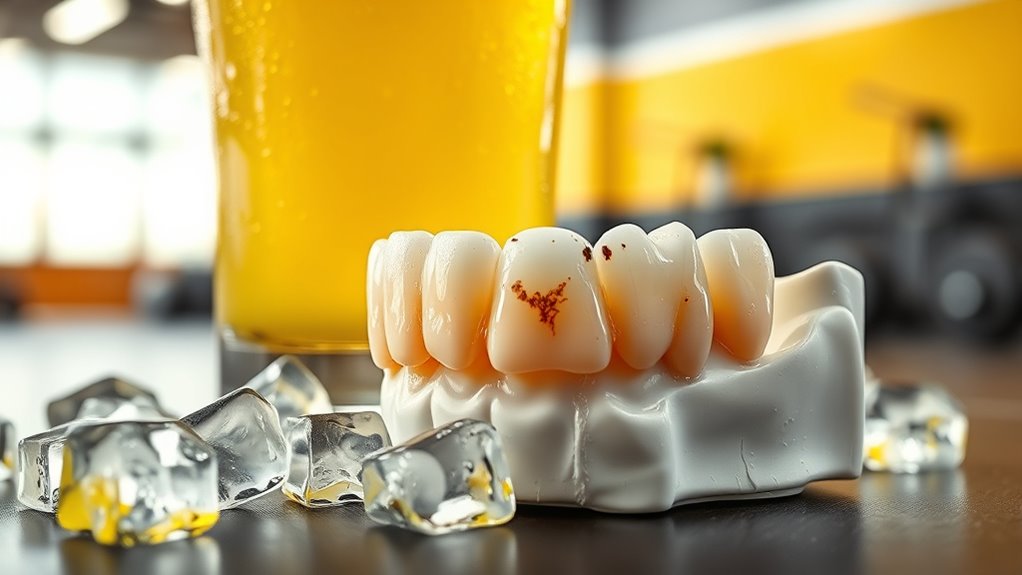
The popularity of sports and energy drinks has surged in recent years, especially among young people and active individuals. You’ll see these drinks everywhere—on store shelves, at sporting events, and in gyms.
Sports drinks like Gatorade are favored for their electrolyte content, helping athletes replenish minerals lost during activity.
Energy drinks such as Red Bull and Monster are consumed for a caffeine boost, increasing alertness and performance.
This rising consumption is driven by aggressive marketing, sports culture, and the perception that these beverages are essential for recovery and energy.
However, their widespread popularity raises concerns about dental health. The frequent intake of these drinks can lead to dental erosion, weakening your teeth’s enamel and increasing the risk of cavities over time. Additionally, the high acidity levels in many of these beverages can accelerate tooth enamel erosion, further compromising dental integrity.
Moreover, the high sugar content found in many sports and energy drinks can contribute to dental decay, especially when consumed frequently or held in the mouth for extended periods.
Composition and Characteristics of Sports Drinks
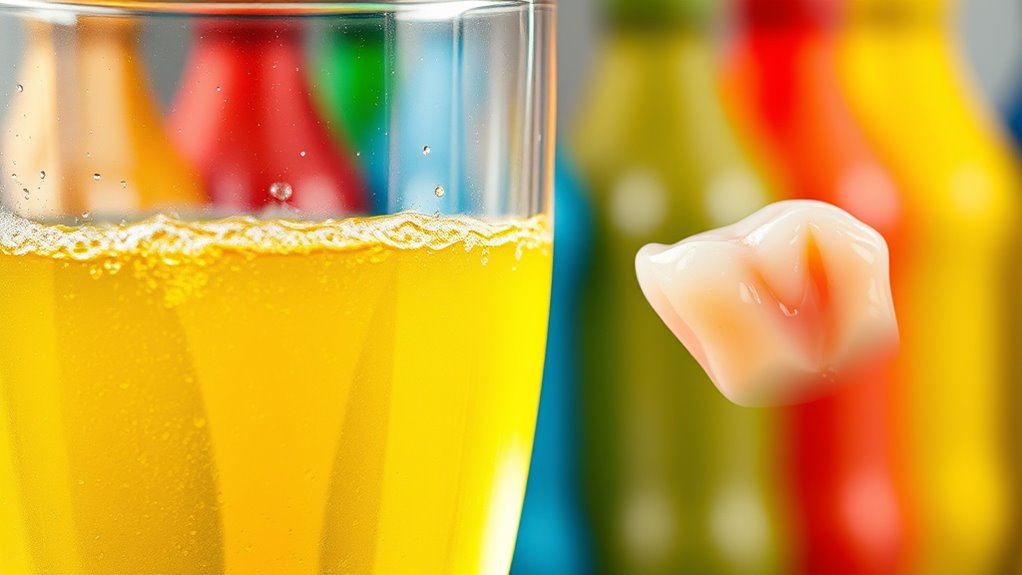
Sports drinks are formulated to quickly restore hydration and energy during physical activity by containing carbohydrates like glucose, sucrose, maltodextrins, and fructose.
These beverages also include electrolytes such as sodium, potassium, and magnesium to replace minerals lost through sweating.
Electrolytes like sodium, potassium, and magnesium help replenish minerals lost during sweating.
The pH of most sports drinks ranges from 3.0 to 4.0, making them quite acidic and capable of contributing to enamel erosion over time. Research supports the link between acidity and enamel erosion.
Their sugar content is high, which can impact oral health if consumed frequently. Vibrational energy and positive attitudes can help mitigate some negative effects by promoting overall well-being, though they don’t directly prevent dental issues.
The combination of acidity and sugar content increases the cariogenic potential of sports drinks, putting your teeth at risk.
Understanding their composition helps you recognize how their acidity and sugar levels can affect your enamel, emphasizing the importance of moderation for maintaining oral health.
Additionally, frequent consumption of highly acidic drinks can damage tooth enamel, leading to increased sensitivity and decay.
How Acidity and Sugar Contribute to Dental Damage
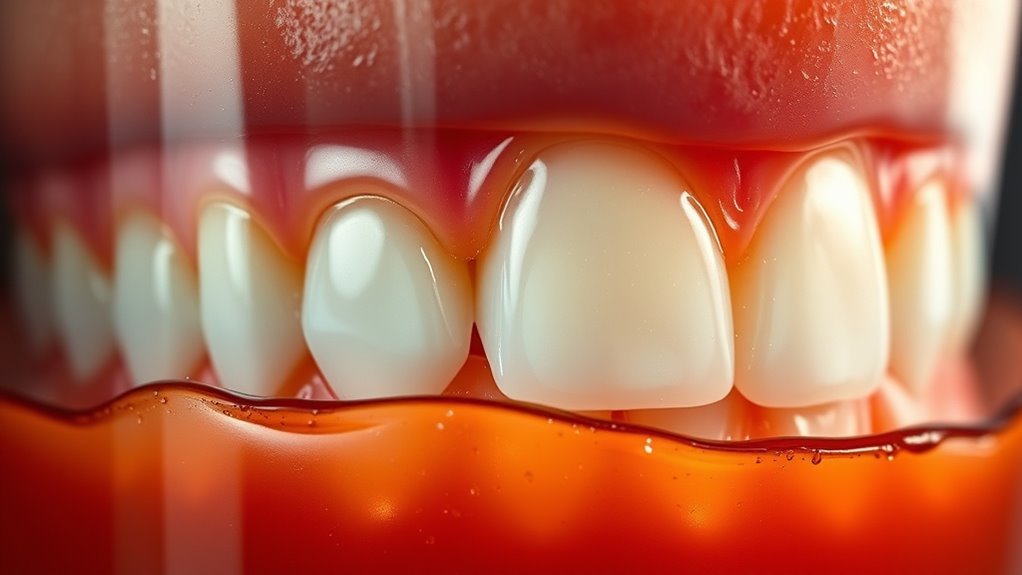
Because of their low pH and high sugar content, sports drinks can cause considerable dental damage. The acidity in these drinks, often below pH 5.5, leads to enamel erosion by demineralizing your tooth surface. A new sentence with enamel erosion and the rest of the sentence. Simultaneously, the high sugar content fuels oral bacteria, increasing acid production that promotes dental decay. Frequent sipping prolongs acid exposure, softening enamel and making your teeth more vulnerable to cavities. Components like citric acid chelate calcium from your teeth, weakening the enamel structure further. Additionally, dental erosion can accelerate when combined with poor oral hygiene practices, further compromising tooth integrity. Recognizing the importance of oral health is crucial in understanding how to protect your teeth from such damage. Proper hydration and limiting sports drink intake can help minimize acid exposure and its harmful effects. Moreover, preventive measures such as using fluoride-containing products can strengthen enamel against acid attacks. When combined, acidity and sugar in sports drinks substantially heighten the risk of erosion and decay. Over time, this damage can compromise your oral health, leading to sensitivity, discoloration, and cavities if proper precautions aren’t taken.
Evidence From Laboratory and Clinical Studies
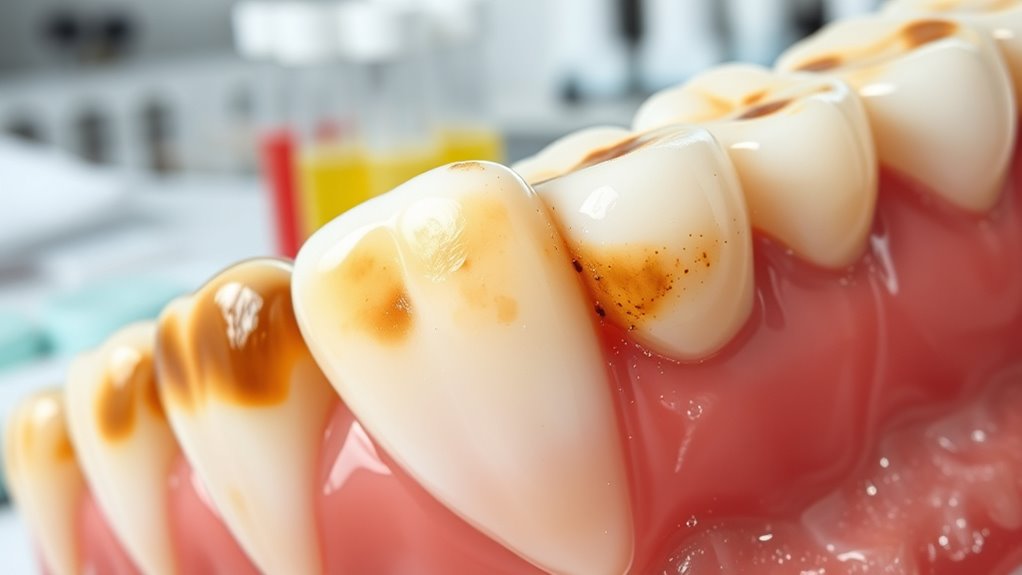
Laboratory studies provide compelling evidence that sports drinks can damage tooth enamel. In vitro studies using extracted human or bovine teeth show that these drinks with low pH and high acidity can cause enamel erosion by softening the surface and decreasing surface hardness. Seasonal variations can also influence the susceptibility of teeth to erosion, as changes in diet and hydration levels impact oral health. Owens et al. (2014) found that after five days of immersion, enamel weight loss exceeds 3%, highlighting their erosive potential. Laboratory evidence indicates that the acidic pH of sports drinks contributes directly to dental erosion. Additionally, understanding the chemical properties of these beverages helps explain their erosive effects on dental tissues. The regulatory challenges associated with marketing these drinks also impact public awareness of their risks. Recognizing the biological mechanisms underlying enamel erosion emphasizes the importance of preventive measures and public education. Furthermore, the formulation of the drinks, including added acids and sugars, plays a significant role in their erosive capacity.
Factors Influencing the Risk of Dental Erosion
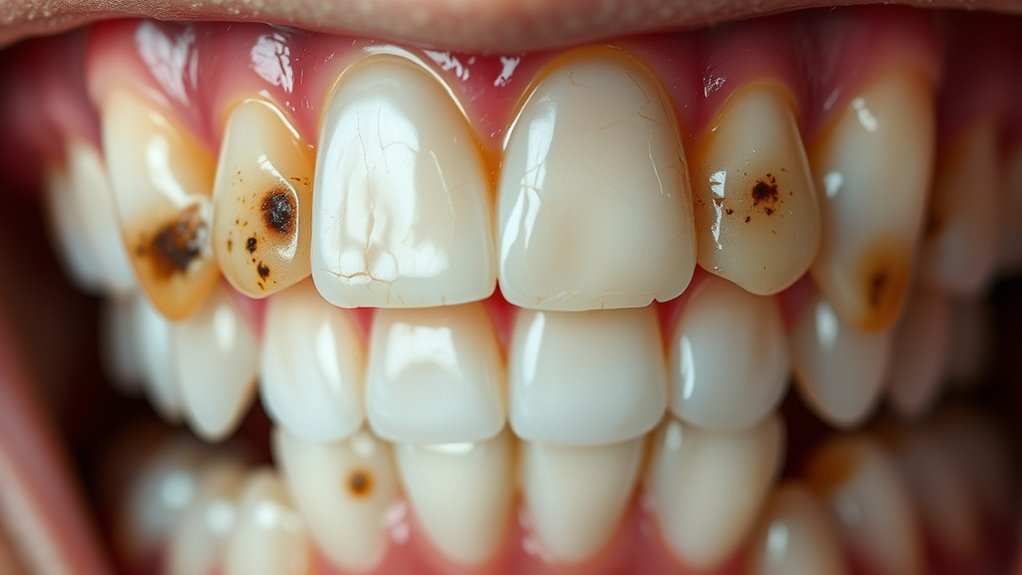
Your risk of dental erosion depends heavily on the acidity and composition of the sports drinks you consume. Frequent drinking and prolonged exposure worsen enamel damage, especially if the beverage contains chelating agents like citric acid. Additionally, the growth potential of investment platforms influences the variety and availability of sports drinks on the market, indirectly affecting consumer choices. The regulatory environment also impacts the formulation and marketing of these beverages, shaping consumer awareness and safety standards. Factors like saliva flow and beverage temperature also influence how vulnerable your teeth become. Moreover, choosing natural, less acidic options can help mitigate some of these risks and promote better dental health. Staying informed about industry regulations is essential for understanding which products are safer for dental health. Understanding the market trends in beverage consumption can further guide healthier choices and reduce erosion risk.
Acidic Content Levels
The acidic content levels in sports drinks play an essential role in determining their potential to cause dental erosion. Low pH levels, often below 5.5, weaken enamel and increase erosion risk.
Beverages containing citric acid are especially harmful because they chelate calcium and further lower surface pH. The buffering capacity, or titratable acidity, influences how long a drink maintains its acidity, prolonging enamel exposure.
High concentrations of acids like citric, malic, or phosphoric acid considerably heighten the potential for dental erosion compared to less acidic drinks.
When acidity and low pH combine, they create a hostile environment for your teeth, leading to demineralization and weakened enamel.
Understanding these factors helps you recognize the erosive power of sports drinks and take steps to protect your oral health.
Consumption Frequency Impact
How often you consume sports drinks directly impacts your risk of dental erosion. Increased consumption frequency means more acid exposure, which accelerates enamel loss and heightens your chances of dental erosion.
Drinking sports drinks repeatedly throughout the day, especially in small sips, prolongs contact between acids and your teeth, making erosion worse than quick consumption.
Athletes and youth who’ve daily intake are at greater risk, as continuous acid contact weakens the enamel surface over time.
The erosive potential intensifies if drinks contain citric acid and are consumed without rinsing or waiting before brushing.
Understanding the importance of credit card terms can help you make better financial decisions when purchasing sports drinks or other health-related products, ensuring you avoid unnecessary expenses or scams.
To protect your oral health, limit your sports drink intake and avoid frequent, prolonged exposure that can lead to significant enamel loss.
Beverage Composition Factors
Beverage composition plays an essential role in determining the risk of dental erosion from sports and energy drinks. Low pH levels, often below 5.5—sometimes as low as 2.67—make drinks highly acidic and capable of demineralizing enamel.
Citric acid and other chelating agents increase the beverage’s capacity to dissolve calcium, accelerating enamel erosion. Beverages with high titratable acidity require more buffering capacity to neutralize, prolonging their erosive effects.
Additionally, mineral content, such as calcium and phosphate, can help reduce damage by strengthening enamel. The overall composition, including beverage acidity and sugar levels, directly influences erosion risk, with more acidic, sugary drinks posing greater threats.
Understanding how electric bike components function and their specifications can also inform choices related to energy efficiency and maintenance, indirectly supporting sustainable practices. Proper understanding of these factors helps you make informed choices to protect your dental health.
Strategies to Protect Teeth While Staying Hydrated
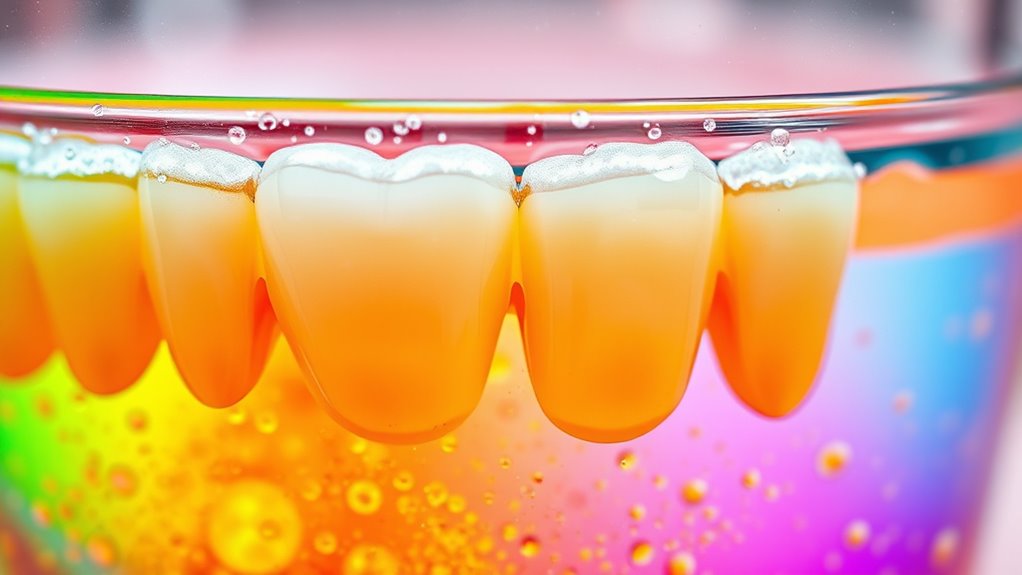
To protect your teeth while staying hydrated with sports drinks, adopting simple strategies can make a considerable difference. Rinsing your mouth with water immediately after consuming sports drinks helps neutralize acids and wash away sugars, reducing dental erosion risk.
Using a straw when drinking minimizes contact with teeth, decreasing exposure to erosive acids and sugars. Waiting at least 45 minutes before brushing allows your enamel to re-harden, preventing damage to softened enamel.
Opt for low-acid, low-sugar sports drinks or dilute them with water to lessen their erosive potential. Limiting how often and how long you consume sports drinks, especially outside of athletic activity, can considerably protect your teeth and support overall enamel health.
Being aware of the acidic content in sports drinks can help you choose better options and further protect your dental health. Additionally, choosing drinks with HEPA filtration can ensure that your overall hydration is free from harmful particles that could indirectly affect oral health.
These hydration strategies are simple, effective ways to enjoy sports drinks responsibly.
The Role of Dietary Habits and Oral Hygiene

Your dietary habits and oral hygiene routines play an essential role in safeguarding your teeth, especially when consuming sports drinks. Poor oral care combined with frequent consumption of acidic beverages accelerates tooth erosion and increases decay risk.
To protect your enamel, focus on maintaining good dental hygiene by brushing twice daily with fluoride toothpaste and flossing regularly. Rinsing with water after drinking sports drinks helps wash away acids and sugars.
Avoid brushing immediately after consuming acidic beverages; wait at least 30-45 minutes to prevent enamel wear. Incorporate fluoride mouthwash into your routine to strengthen enamel.
Additionally, limiting sugary snacks and acidic foods reduces the overall erosive impact. By balancing your diet and maintaining proper oral care, you can minimize the damaging effects of dietary habits on your teeth.
Recommendations for Consumers and Dental Professionals
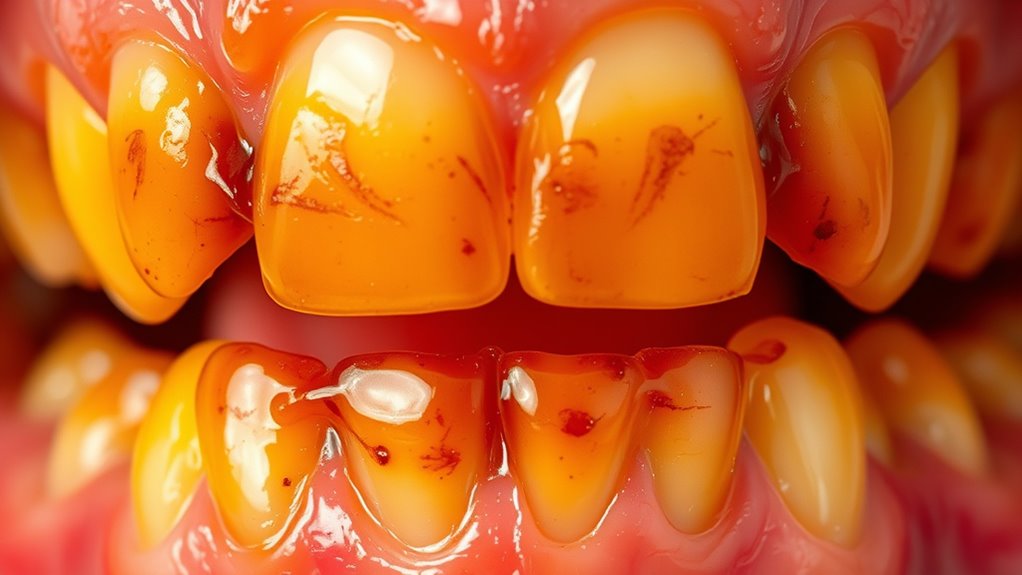
To protect your teeth from erosion, you should be aware of the risks associated with sports drinks and adopt protective habits. Incorporating dynamic communication exercises into your routine can also help maintain open dialogue with your dental professional about your oral health concerns. Dental professionals can guide you on effective strategies, like rinsing with water or choosing lower-acid options.
Educating on Erosive Risks
Understanding the erosive risks of sports drinks is essential for both consumers and dental professionals. These acidic beverages, with pH levels below 5.5, can cause dental erosion by promoting enamel demineralization.
Frequent or prolonged consumption increases the risk of damage to your oral health. To minimize this, consider protective strategies such as drinking through a straw, avoiding brushing immediately after intake, and opting for lower-acid or calcium-enriched drinks.
Educate yourself on ingredient labels to identify high acidity and sugar content. Dental professionals should emphasize moderation and proper oral hygiene to patients, highlighting the importance of rinsing with water after drinking sports drinks. Additionally, choosing electric bikes for commuting can reduce exposure to sugary and acidic drinks by encouraging healthier, active lifestyles. Maintaining awareness of oral health risks helps prevent erosive damage and maintains healthier teeth over time. Being mindful of acidic beverage consumption can further protect your dental enamel from unnecessary erosion, especially since personal development techniques like mindfulness can foster better health choices.
Furthermore, staying informed about dental erosion and regularly consulting with dental professionals can aid in early detection and management of enamel loss.
Promoting Protective Practices
Employing protective practices can substantially reduce the risk of dental erosion from sports drinks. To enhance dental protection, limit exposure by drinking through a straw and avoid brushing immediately after consumption, as this can worsen enamel erosion. Rinse with water right after drinking to neutralize acids and support oral hygiene. Regular dental check-ups help identify early signs of enamel erosion and reinforce strategies to prevent damage. Implementing these protective practices ensures better oral health and minimizes erosion risks. Additionally, staying informed about dental erosion can help individuals make better choices to preserve their tooth enamel.
Frequently Asked Questions
Are Electrolyte Drinks Bad for Your Teeth?
You might wonder if electrolyte drinks are bad for your teeth. They can be, because many have low pH levels and contain acids and sugars that wear down enamel and increase cavities.
When you sip often during exercise, acids stay on your teeth longer, causing damage. To protect your teeth, rinse with water after drinking and limit how often you consume these beverages.
What Drink Damages Teeth the Most?
So, you’re wondering which drink wrecks your teeth the most? Honestly, energy drinks like Red Bull and Monster are the villains here. Their low pH and high acidity strip away enamel quickly, especially when combined with sugars that feed decay.
Fruit-flavored sports drinks with citric acid are just as bad, chelating minerals and causing erosion. If you want to keep your smile, avoid these acidic offenders at all costs.
Can the Enamel on Your Teeth Be Restored?
Your enamel can’t naturally regenerate once it’s lost, so prevention is key.
Mild erosion might be temporarily reversed through remineralization treatments like fluoride and calcium phosphate, but extensive damage needs restorative procedures such as bonding or crowns.
Using fluoride and saliva’s minerals can strengthen your enamel against decay.
Keep in mind, once enamel is severely damaged, it can’t be fully restored, making early care and prevention essential.
Why Does Gatorade Make My Teeth Sensitive?
You might think Gatorade’s just an invigorating drink, but it’s secretly attacking your teeth. Its acidity erodes enamel, exposing the sensitive dentin underneath.
The high sugar content feeds bacteria that produce more acids, worsening the problem. Sipping it often keeps your teeth under attack longer, making sensitivity worse.
Conclusion
Think of your teeth as a fortress under siege—the constant assault of acidic and sugary sports drinks weakens their defenses. Just like a fortress needs reinforcements, your teeth require proper care and mindful choices. Staying hydrated with water and maintaining good oral hygiene can be your shield against erosion. Remember, every sip is a strategic move—protect your smile today, so it remains resilient tomorrow. Your dental health depends on the battles you choose to fight now.








